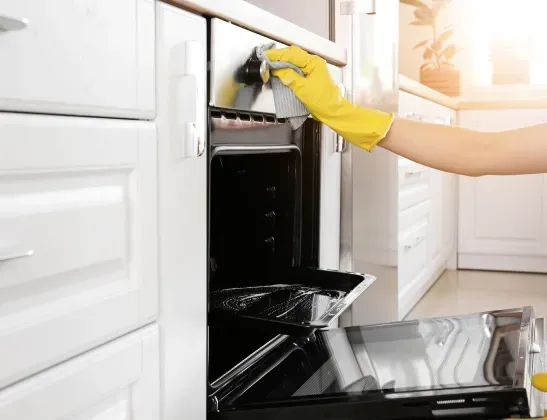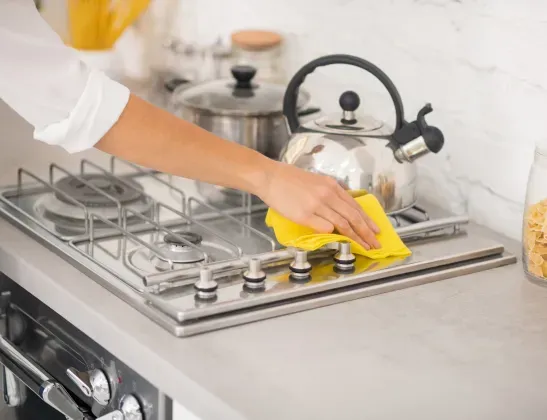How Often Should You Clean Your Kitchen Appliances?
Fri Jul 19 2024
- Tips & Tricks
In this guide, we'll explore essential maintenance routines to make sure your kitchen appliances are in great shape. From your refrigerator to your coffee maker, discover the tips and schedules you need for a cleaner, more efficient kitchen.

The Importance of Regular Appliance Cleaning
Before we jump into the 'how' and 'when,' let's talk about why regular appliance cleaning is crucial. It's not just about appearances; it's about:
• Ensuring food safety and hygiene
• Improving appliance efficiency (and lower energy bills!)
• Extending the lifespan of your appliances
• Enhancing your kitchen's overall appearance and smell
Factors Affecting Longevity
Bosch is renowned for its commitment to quality craftsmanship. Dishwashers from Bosch are constructed with durable materials and undergo rigorous testing to ensure longevity and reliability. Bosch invests in research and development to incorporate the latest technological advancements into its appliances. This focus on innovation results in dishwashers that not only deliver superior cleaning performance but also boast features designed to enhance durability and longevity.
How to Clean Your Refrigerator
Let's start with refrigerators. This hardworking appliance needs regular TLC to keep your food fresh and your energy bills low. Regular cleaning extends its lifespan and keeps it running smoothly.
• Weekly: Give those shelves and drawers a quick wipe-down. This is also a great time to check for expired food items. Use a mixture of warm water and mild dish soap for general cleaning, and remember to dry thoroughly to prevent mold growth.
• Monthly: Time for a deeper clean. Take out all the removable parts and give them a good wash. Don't forget those door seals. Use a soft brush or toothbrush to gently clean the rubber gaskets, ensuring they remain pliable and effective.
• Quarterly: Vacuum those condenser coils (usually found at the back or bottom of the fridge). This simple task can significantly improve your fridge's efficiency. While you're there, check and clean the drip pan if your model has one accessible.
• Important Note: When transitioning into hotter months, cleaning the condenser coils on your freezers and refrigerators is especially crucial. Dust and debris can accumulate on the coils, restricting airflow and causing the appliance to work harder. This can lead to higher energy bills and potential overheating. Facilitating good airflow by keeping these coils clean will help your appliances run efficiently and extend their lifespan.
How to Clean Your Dishwasher
The appliance that cleans your dishes needs cleaning, too. Over time, food particles and soap scum can build up inside your dishwasher, reducing its efficiency.
• Weekly: Remove and clean the filter. Also, give the door edges and seals a quick wipe. Check for any food debris in the spray arms and clean them out if necessary.
• Monthly: Run an empty cycle with a cup of white vinegar in the top rack, followed by a baking soda cycle. Also, inspect the drain area for any buildup and clean it out to prevent clogs.

How to Clean Your Oven and Cooktop
These appliances see a lot of action, so they need regular attention to prevent buildup and maintain their performance. Cleaning your cooktops and ovens is a straightforward process.
• After Each Use: Wipe down the stovetop and burners. It's much easier to clean spills when they're fresh. For gas stoves, make sure the burner holes are clear of food debris to maintain even heating.
• Monthly: Give your oven a deep clean. A baking soda and water paste works wonders on tough, baked-on grime. Run the cleaning cycle for self-cleaning ovens, but remove any large food particles first to prevent smoke.
• Quarterly: Pull out the oven and clean it behind and underneath. You might be surprised by what you find! Also, check and clean the oven door hinges and seals to make sure they function correctly.
How to Clean Your Microwave
Small appliances like microwaves can get messy quickly. Regular cleaning will help keep it running smoothly and prevent unpleasant odors.
• Weekly: Wipe down the interior and exterior surfaces. Pay special attention to the control panel and handle, as these areas can harbor bacteria from frequent touching.
• Monthly: Heat a bowl of water with lemon juice in the microwave for a few minutes for a deeper clean. The steam will loosen any stuck-on food, making it easy to wipe away. Don't forget to clean the turntable and its support thoroughly.
How to Clean Your Coffee Maker
• Daily: Rinse removable parts after each use. This includes the carafe, filter basket, and any reusable filters.
• Weekly: Wash the carafe and filter basket with warm, soapy water. For drip coffee makers, wipe down the warming plate once it's cool.
• Monthly: Run a cycle with equal parts water and white vinegar to descale the machine. Follow up with several cycles of clean water to rinse thoroughly. Clean the pod holder and puncture needles according to the manufacturer's instructions for pod-based machines.
How to Clean Small Kitchen Appliances
Let's not forget about the small kitchen appliances that make our lives easier. Here's how to keep them in great shape:
Blenders
• After each use: Rinse the jar and blades immediately to prevent food from drying and sticking.
• Weekly: Disassemble your blender and wash all removable parts in warm, soapy water. For tough stains, blend a mixture of warm water and dish soap in the jar.
Toasters
• Weekly: Unplug and shake out crumbs. Wash the removable crumb tray.
• Monthly: Use a small brush to clean the interior, removing all crumbs to prevent burning and potential fire hazards.
Food Processors
• After each use: Wash removable parts in warm, soapy water or in the dishwasher if they're dishwasher-safe.
• Monthly: Clean the base unit with a damp cloth, paying special attention to crevices and the area around the buttons.
Electric Kettle
• Weekly: Wipe the exterior and interior with a damp cloth.
• Monthly: Descale by boiling equal parts water and white vinegar, then rinsing thoroughly.
Remember, always unplug these appliances before cleaning, and never submerge electrical components in water!

Expert Tips for Appliance Care
1. Always refer to your appliance's user manual for specific cleaning instructions.
2. Always refer to your appliance's user manual for specific cleaning instructions.
3. For stubborn stains, let cleaning solutions sit for a few minutes before wiping.
4. Don't forget often-overlooked areas like the top of the refrigerator or under the oven.
5. Consider using eco-friendly cleaning products to reduce your environmental impact.
6. Regularly check and replace any appliance filters for optimal performance.
Why Choose Quality Appliances from Kelly's Home Center
Investing in high-quality kitchen appliances can make your cleaning routine easier and less frequent. Premium appliances often have features like self-cleaning ovens, fingerprint-resistant finishes, and advanced filtration systems that significantly reduce your maintenance workload.
When shopping for new appliances, consider energy efficiency, durability, and ease of cleaning. While they may cost more upfront, quality appliances can save you time and money in the long run through lower energy bills and reduced maintenance needs.
Look for appliances with:
• Smooth, easy-to-clean surfaces
• Removable parts for thorough cleaning
• Self-cleaning or steam-cleaning features
• Smart technology that alerts you when maintenance is needed
Visit Kelly's Home Center for Your Appliance Needs
Remember, a clean kitchen is a happy kitchen. By following these guidelines, you'll not only extend the life of your appliances but also create a more hygienic and efficient cooking environment.
Ready to upgrade your kitchen appliances? At Kelly's Appliances, we aim to provide the best mattresses for your needs. Feel free to contact us and stay updated through our blog. We have all of these great brands (and more) on display in our stores, so visit us at any of our Oregon-based appliance store locations in Eugene, Salem, Corvallis, and Medford.
Related readings:
• How to Clean Your Thermador Professional Wall Oven
• Best Way To Clean Out A Microwave
Frequently Asked Questions About Cleaning Kitchen Appliances
How often should I clean my refrigerator coils?
Clean your refrigerator coils every 3-6 months to maintain efficiency and prevent overheating.
Can I use regular soap to clean my dishwasher?
Using specialized dishwasher cleaners or a vinegar solution is best to avoid excess suds and residue.
How do I know if my oven needs cleaning?
If you notice smoke, unpleasant odors, or visible food residue when using your oven, it's time for a cleaning.
Is it safe to use bleach to clean kitchen appliances?
While bleach is a powerful disinfectant, it's generally not recommended for most kitchen appliances. Stick to mild detergents or specialized cleaners.
How often should I replace my refrigerator water filter?
Most manufacturers recommend replacing the water filter every 6 months or after filtering about 300-400 gallons of water.
Related Articles
Welcome to our website! As we have the ability to list over one million items on our website (our selection changes all of the time), it is not feasible for a company our size to record and playback the descriptions on every item on our website. However, if you are an American with a disability we are here to help you. Please call our disability services phone line at 309-691-4100 during regular business hours and one of our kind and friendly personal shoppers will help you navigate through our website, help conduct advanced searches, help you choose the item you are looking for with the specifications you are seeking, read you the specifications of any item and consult with you about the products themselves. There is no charge for the help of this personal shopper for any American with a disability. Finally, your personal shopper will explain our Privacy Policy and Terms of Service, and help you place an order if you so desire.
Copyright © 2009 - 2025 Company All Rights Reserved.
This site is protected by reCAPTCHA and the Google Privacy Policy and Terms of Service apply.

